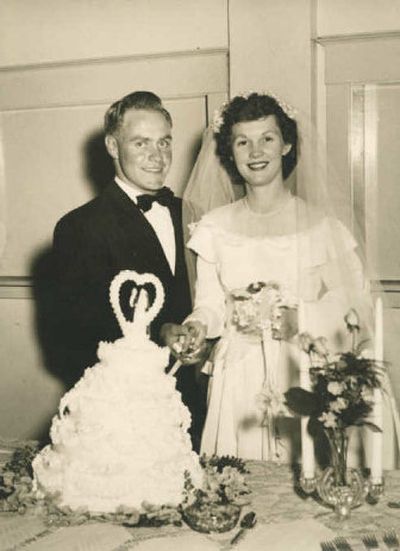Don Stamback’s generosity, humor will be missed

Merle Stamback can’t say what she will miss most about her husband, Don Stamback.
There are too many things, and the tears come too easily.
“He was a very affectionate person,” Stamback says. Always there with a loving hug or gesture. “He would bring me my coffee every morning, no matter where I was,” his wife said.
As she sat remembering the special things that her husband of 56 years did for her on a daily basis, one of Don Stamback’s three great-grandsons wanders over, his big blue eyes full of questions.
“Where’s Papa?” the 3-year-old inquires.
“He’s up with the stars now, remember?” the child’s grandmother and Don Stamback’s only child tells him.
“Yeah, Papa’s the stars,” the child says.
Stamback, 78, died July 26 after being hit by a car July 11 in Airway Heights. The longtime Spokane Valley resident was attempting to cross Highway 2 in a crosswalk. A vehicle that had stopped to let him cross was hit from behind by a water truck belonging to an asphalt company, pushing the car into Stamback.
He was thrown 10 feet and suffered severe head injuries. Stamback spent his last days at Harborview Medical Center in Seattle.
“It’s just really awful,” his daughter, Sherryl Chamberlain said. “Just senseless and awful.”
Stamback was known for his sense of humor and his generous spirit. Born in Montana and raised on a cattle and wheat ranch near Colfax.
Stamback worked hard most of his life.
It was on the ranch where he met his wife. Merle Stamback’s sister was working as a housekeeper on the ranch when she cut her hand after breaking a platter.
“She had to have help, and I went down,” Merle Stamback said. “We hit it off.” They were both teenagers then, and their relationship grew over four years, until Merle Stamback finished high school.
“That’s when things got serious,” she said.
They married in 1949 at Millwood Presbyterian Church and returned to the ranch.
In 1952 Stamback was shipped off to the Philippines with the U.S. Navy, where he was serving as a Seabee during the Korean War.
He was gone for four years, coming home only once a year to see his wife. “It was difficult,” Merle Stamback said. “But we survived.” After Stamback returned, they continued farming for a while on the ranch, but times had changed, and Stamback was ready for change.
They lived in Tekoa, Wash., for eight years, and continued to farm, before moving to Ocean Shores, Wash., where Stamback worked as a heavy-equipment operator helping to pave the roads in the small tourist town that are still there today.
They later moved to Spokane Valley, and Stamback began working for Washington Water Power as a heavy-equipment mechanic. He retired from WWP in 1991 after 13 years.
But even after his retirement, Stamback wouldn’t rest. “Everything he did was to perfection,” his wife said. “To him there was only one way to do things.”
He could always be found tinkering with cars and trucks or just fixing anything that needed fixing.
Just the week before he died, Stamback had finished putting siding on his Spokane Valley home.
“He was the one that started before the rest of us, and usually ended after the rest of us,” said his daughter. “He was in really good health.” “He had so much to offer and so much life left in him,” she said.
After retirement, Stamback and his wife traveled to all 50 states, Canada and Mexico. They joined a camping club and traveled in a group with their fifth-wheel trailer. Stamback was the mechanic for the group. “We saw so many things,” Merle Stamback said. “He really loved it; meeting interesting people.”
They traveled in the winter months, and spent summer months back in Spokane Valley, with his daughter, three granddaughters and three great-grandsons.
“I’m going to miss watching him play with all those boys,” his daughter said. “He’d give them a hammer and a piece of wood and they would play for hours in the back yard.”
After his death, his family found a poem hidden in the safety deposit box entitled, “To Those I Love.”
“He must have put it in the box when I wasn’t with him,” Merle Stamback said.
The poem reads, “If I should ever leave you whom I love, To go along the Silent Way, grieve not, Nor speak of me with tears, but laugh and talk.”
“It kind of says it all,” his daughter said.